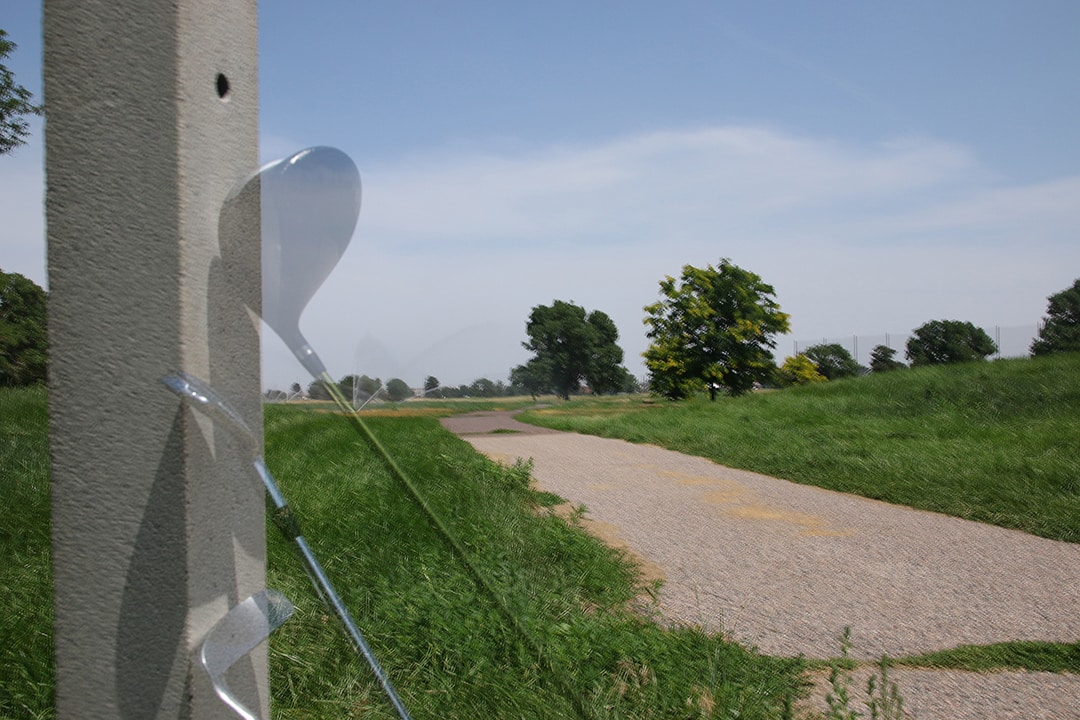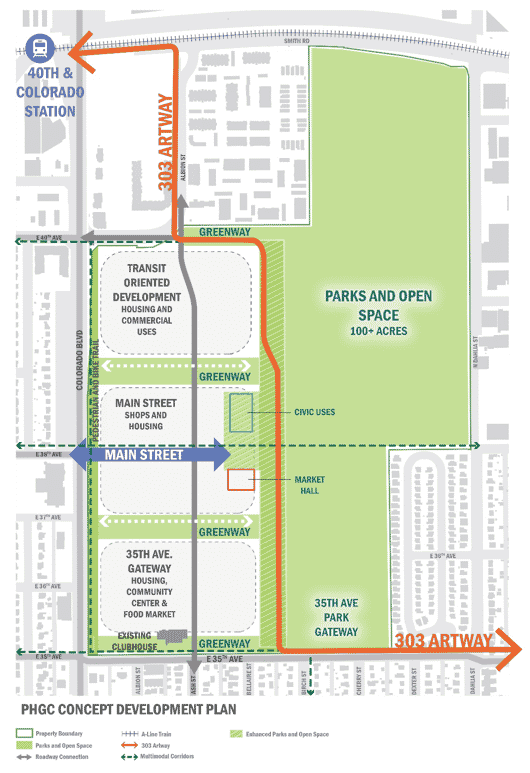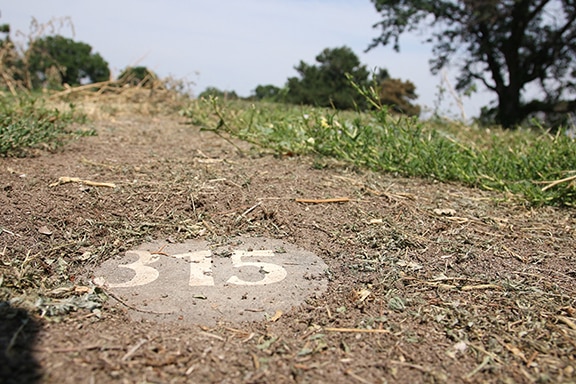
Park Hill Golf Club was an 18-hole course that operated from 1932 until 2018. The land was sold to Westside Investment Partners in 2019. (BusinessDen file photo illustration)
The development firm that owns the former Park Hill Golf Club property has submitted plans to the city outlining its general vision for the site, which will eventually have to be approved at the ballot box.
Glendale-based Westside Investment Partners said in its “large development review” document that it wants to donate approximately 100 of the property’s 155 acres — or about 65 percent — to the city for use as parks and open space.
That’s an increase from last year, when Westside pledged to keep at least 60 acres as park space. Westside executive Kenneth Ho said the change stems from an 18-month planning process spearheaded by the city that asked nearby residents what they wanted at the site.
“We’ve heard loud and clear that the community wants a new park here,” Ho said.
A 100-acre park would be the city’s fourth largest, according to Westside. Cheesman Park, for comparison, is 80 acres.
Large development review documents are required for development sites larger than 5 acres. The owner of the Colorado Avalanche and Denver Nuggets submitted a large development review document for the parking lots around Ball Arena earlier this year.
The Park Hill property was operated as a golf course from 1933 until the end of 2018. Westside purchased the property from the nonprofit that previously owned it, which had leased it to a company that operated the golf course, in 2019 for $24 million. The sale came two years after the city said it wanted to buy the property itself, a deal that was scuttled in part due to a lawsuit from the golf course operator claiming it had a right of first refusal to buy the course.
The park space would be on the eastern portion of the property. Westside’s vision calls for the western portion, which butts up against Colorado Boulevard, to be developed. The plans divide the development into three distinct zones.
The northwest portion, at the corner of Colorado Boulevard and 40th Avenue, would be a transit-oriented development, with a mix of housing and commercial uses intended to take advantage of RTD’s 40th and Colorado station just to the north.
Below that, generally across from where 38th Avenue runs into Colorado Boulevard, would be a “main street” district with shops and housing.

A map showing Westside Investment Partners’ vision for the 155-acre property. (Map courtesy of Westside Investment Partners)
And on the southwest portion of the site, at the corner of Colorado and 35th Avenue, would be the final development zone. The plans call for more housing, a community center and a grocery store there.
Density would generally taper from north to south, highest in the transit-oriented zone, and also from west to east, with higher density along Colorado Boulevard and lower density up against the park. Building heights would max out at 12 stories in the transit-oriented zone and about eight stories in the middle main street zone.
Between the development zones would be “greenways” — essentially open space that would connect Colorado Boulevard to the parkland on the east side of the property.
The plans call for a mix of housing types, from high-rise apartment buildings to townhomes, and for both for-sale and for-rent units. Income-restricted housing would be incorporated into the project.
Ho said it’s too early in the process to give a total number of residential units that could be built at the site, as well as the specific percentage of them that would be income restricted.
But he said that the percentage will exceed those included in the city’s recently passed “Expanding Housing Affordability” plan — which range from 8 to 15 percent per project, depending on various factors — and noted the income-restricted units would include both for-sale and rental units.
Ho said Denver is desperately in need of more housing.
There are a couple major hurdles, however, that Westside’s plans must clear for the company’s vision to become a reality.
Although Westside owns the property, it can’t legally build on it. The property is currently covered by a conservation easement that requires the property be used as a golf course. According to the city, the easement dates to 1997, when the nonprofit that owned the land at the time needed more money to operate the golf course. The city agreed to pay Clayton $2 million in exchange for use of the land being restricted.
After Westside bought the land in 2019, the city agreed to pay Westside $6 million as part of a settlement agreement related to stormwater detention work on a portion of the property and to end all litigation related to the property.

A yardage marker remains at the former No. 10 tee box at the former Park Hill Golf Club. (BusinessDen file photo)
According to that agreement, Westside has until late 2022 to come up with an alternative plan to the golf course through public outreach. Until then, the city will not enforce the provisions of the easement that require a golf course to operate there.
If Westside can’t convince the city the land should be used for something else, it will be required to restore a golf course and comply with the terms of the easement’s restrictions, according to the agreement.
A second hurdle to development emerged in November, when Denver voters approved Initiative 301, which mandates a citywide vote on development that is slated for park land when there’s an effort to cancel a conservation easement.
The initiative was spearheaded by Yes for Parks and Open Space, a political action committee in favor of keeping the Park Hill Golf Club property as open space. An opposing initiative backed by Westside on the same ballot was unsuccessful.
Groups like Yes for Parks and Open Space and the similarly focused Save Open Space Denver point to the vote as a sign that Denverites don’t want the property to be developed.
The city, however, points to a survey it conducted of nearby residents. That survey, of 1,300 people who live within a mile of the property, found that 70 percent were in favor of some form of development on the property. Another 22 percent were in favor of keeping the entire property as open space, while 8 percent were in favor of development without keeping open space. Seven percent of respondents wanted the property to remain a golf course, according to the city.
The success of Initiative 301 means that, if Westside wants to develop the property, the plans will ultimately have to be approved by a majority of Denver voters.
Ho said Westside’s plans will first go before the Denver City Council, which will vote on whether to send the plans to voters. Ho said it’s undetermined when that might occur but a citywide vote definitely wouldn’t take place in 2022.
Westside specializes in master-planning the redevelopment of large tracts of land. The company purchased the former Loretto Heights University campus in southeast Denver in 2018, where a similar process took place. Nearby residents there emphasized a desire for historic preservation and affordable housing, Ho said.
Last week, Westside sold 152 acres near Denver International Airport to New York-based PepsiCo for what the beverage giant says will be its largest plant in the United States.
Westside founder Andy Klein was also part of the unsuccessful bid for the Denver Broncos led by private equity billionaire Josh Harris.

Park Hill Golf Club was an 18-hole course that operated from 1932 until 2018. The land was sold to Westside Investment Partners in 2019. (BusinessDen file photo illustration)
The development firm that owns the former Park Hill Golf Club property has submitted plans to the city outlining its general vision for the site, which will eventually have to be approved at the ballot box.
Glendale-based Westside Investment Partners said in its “large development review” document that it wants to donate approximately 100 of the property’s 155 acres — or about 65 percent — to the city for use as parks and open space.
That’s an increase from last year, when Westside pledged to keep at least 60 acres as park space. Westside executive Kenneth Ho said the change stems from an 18-month planning process spearheaded by the city that asked nearby residents what they wanted at the site.
“We’ve heard loud and clear that the community wants a new park here,” Ho said.
A 100-acre park would be the city’s fourth largest, according to Westside. Cheesman Park, for comparison, is 80 acres.
Large development review documents are required for development sites larger than 5 acres. The owner of the Colorado Avalanche and Denver Nuggets submitted a large development review document for the parking lots around Ball Arena earlier this year.
The Park Hill property was operated as a golf course from 1933 until the end of 2018. Westside purchased the property from the nonprofit that previously owned it, which had leased it to a company that operated the golf course, in 2019 for $24 million. The sale came two years after the city said it wanted to buy the property itself, a deal that was scuttled in part due to a lawsuit from the golf course operator claiming it had a right of first refusal to buy the course.
The park space would be on the eastern portion of the property. Westside’s vision calls for the western portion, which butts up against Colorado Boulevard, to be developed. The plans divide the development into three distinct zones.
The northwest portion, at the corner of Colorado Boulevard and 40th Avenue, would be a transit-oriented development, with a mix of housing and commercial uses intended to take advantage of RTD’s 40th and Colorado station just to the north.
Below that, generally across from where 38th Avenue runs into Colorado Boulevard, would be a “main street” district with shops and housing.

A map showing Westside Investment Partners’ vision for the 155-acre property. (Map courtesy of Westside Investment Partners)
And on the southwest portion of the site, at the corner of Colorado and 35th Avenue, would be the final development zone. The plans call for more housing, a community center and a grocery store there.
Density would generally taper from north to south, highest in the transit-oriented zone, and also from west to east, with higher density along Colorado Boulevard and lower density up against the park. Building heights would max out at 12 stories in the transit-oriented zone and about eight stories in the middle main street zone.
Between the development zones would be “greenways” — essentially open space that would connect Colorado Boulevard to the parkland on the east side of the property.
The plans call for a mix of housing types, from high-rise apartment buildings to townhomes, and for both for-sale and for-rent units. Income-restricted housing would be incorporated into the project.
Ho said it’s too early in the process to give a total number of residential units that could be built at the site, as well as the specific percentage of them that would be income restricted.
But he said that the percentage will exceed those included in the city’s recently passed “Expanding Housing Affordability” plan — which range from 8 to 15 percent per project, depending on various factors — and noted the income-restricted units would include both for-sale and rental units.
Ho said Denver is desperately in need of more housing.
There are a couple major hurdles, however, that Westside’s plans must clear for the company’s vision to become a reality.
Although Westside owns the property, it can’t legally build on it. The property is currently covered by a conservation easement that requires the property be used as a golf course. According to the city, the easement dates to 1997, when the nonprofit that owned the land at the time needed more money to operate the golf course. The city agreed to pay Clayton $2 million in exchange for use of the land being restricted.
After Westside bought the land in 2019, the city agreed to pay Westside $6 million as part of a settlement agreement related to stormwater detention work on a portion of the property and to end all litigation related to the property.

A yardage marker remains at the former No. 10 tee box at the former Park Hill Golf Club. (BusinessDen file photo)
According to that agreement, Westside has until late 2022 to come up with an alternative plan to the golf course through public outreach. Until then, the city will not enforce the provisions of the easement that require a golf course to operate there.
If Westside can’t convince the city the land should be used for something else, it will be required to restore a golf course and comply with the terms of the easement’s restrictions, according to the agreement.
A second hurdle to development emerged in November, when Denver voters approved Initiative 301, which mandates a citywide vote on development that is slated for park land when there’s an effort to cancel a conservation easement.
The initiative was spearheaded by Yes for Parks and Open Space, a political action committee in favor of keeping the Park Hill Golf Club property as open space. An opposing initiative backed by Westside on the same ballot was unsuccessful.
Groups like Yes for Parks and Open Space and the similarly focused Save Open Space Denver point to the vote as a sign that Denverites don’t want the property to be developed.
The city, however, points to a survey it conducted of nearby residents. That survey, of 1,300 people who live within a mile of the property, found that 70 percent were in favor of some form of development on the property. Another 22 percent were in favor of keeping the entire property as open space, while 8 percent were in favor of development without keeping open space. Seven percent of respondents wanted the property to remain a golf course, according to the city.
The success of Initiative 301 means that, if Westside wants to develop the property, the plans will ultimately have to be approved by a majority of Denver voters.
Ho said Westside’s plans will first go before the Denver City Council, which will vote on whether to send the plans to voters. Ho said it’s undetermined when that might occur but a citywide vote definitely wouldn’t take place in 2022.
Westside specializes in master-planning the redevelopment of large tracts of land. The company purchased the former Loretto Heights University campus in southeast Denver in 2018, where a similar process took place. Nearby residents there emphasized a desire for historic preservation and affordable housing, Ho said.
Last week, Westside sold 152 acres near Denver International Airport to New York-based PepsiCo for what the beverage giant says will be its largest plant in the United States.
Westside founder Andy Klein was also part of the unsuccessful bid for the Denver Broncos led by private equity billionaire Josh Harris.
